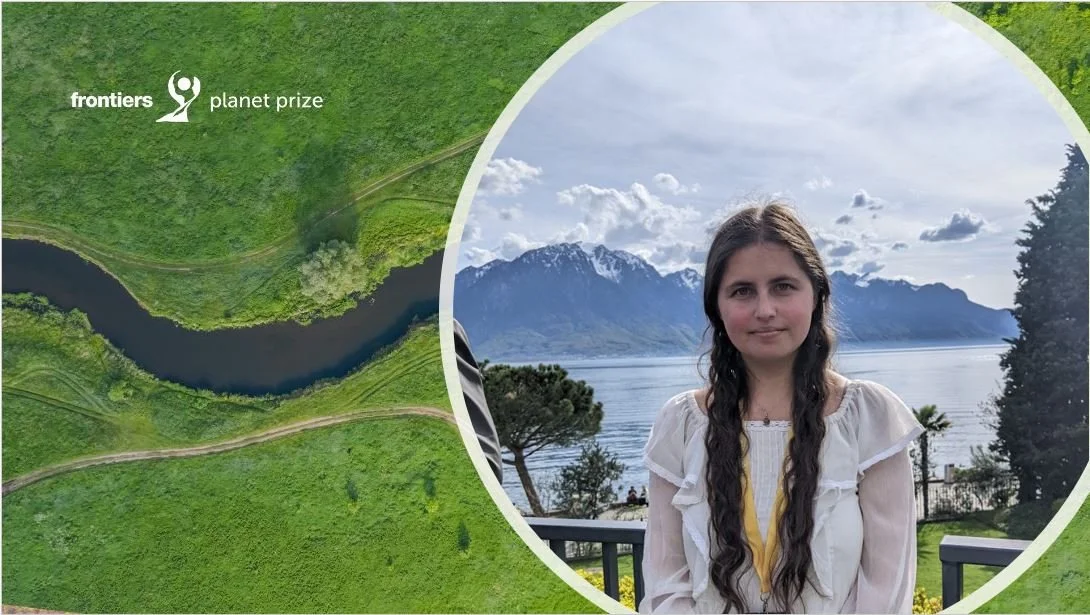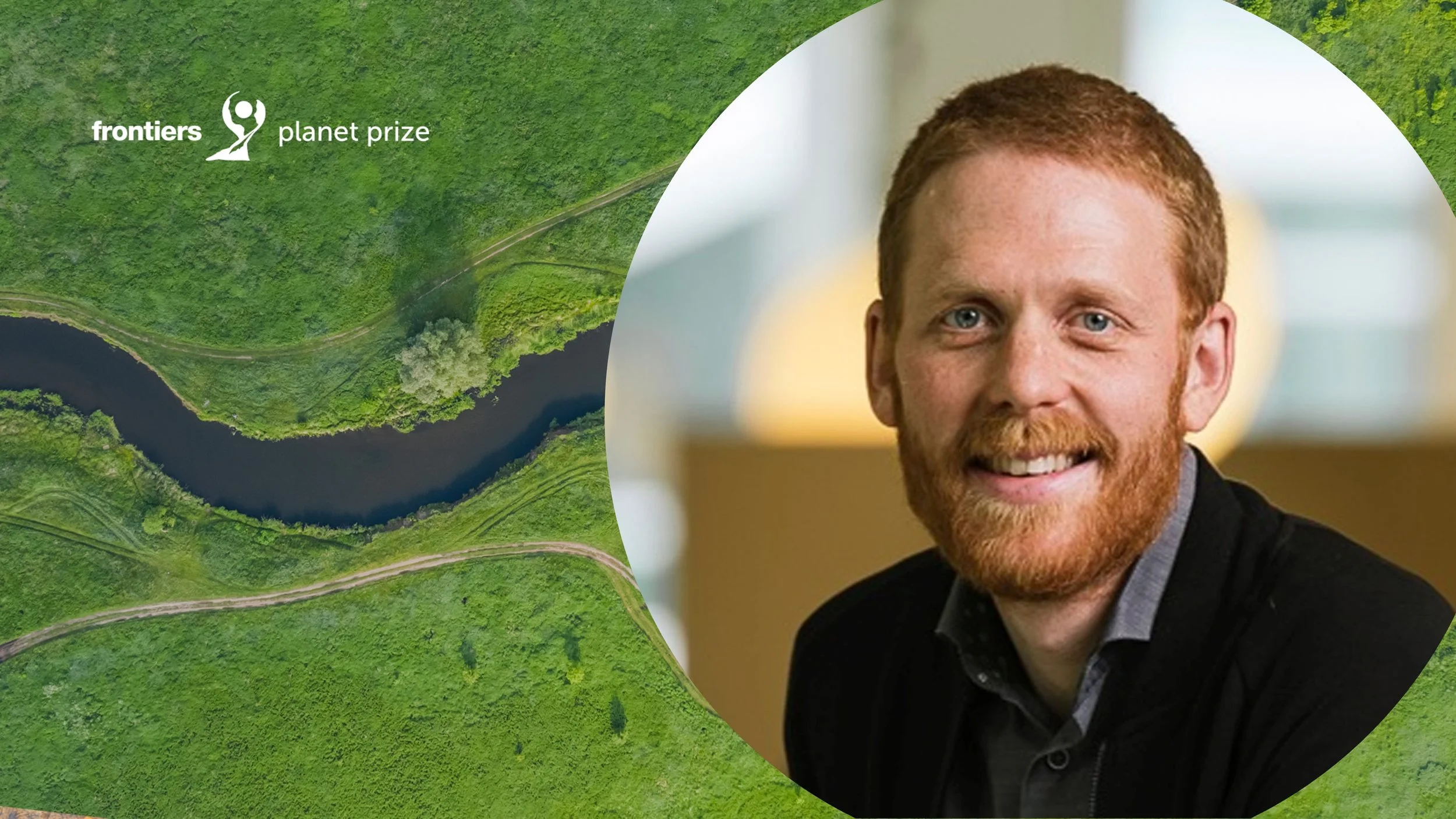Welcome to the
Frontiers Planet Prize
News page

Stay up-to-date with the latest developments of the Frontiers Planet Prize, with articles and thought pieces brought to you directly from the FPP community
Understanding the Relationship Between Arctic Sea Ice Loss and Planetary Boundaries
Seung-Ki Min from Pohang University of Science and Technology, National Champion of South Korea, explores how Arctic Sea ice is impacted under different emissions scenarios, and shares why emissions reduction policies are required to mitigate the potential collapse of multiple planetary boundaries and prevent adverse effects on ecosystems and human societies worldwide.
Thin Green Skin Covering Permafrost – Yet Another Reason to Care About Arctic Vegetation
Gabriela Schaepman-Strub from the University of Zurich, National Champion of Switzerland, together with first author of the winning article, Jacqueline Oehri from McGill University, share their research results highlighting the important functions that the Arctic tundra ecosystem plays within climate change, biosphere integrity, and land-system change. They also call for careful management and protection of functionally critical areas in the Arctic as important actions for the health of our planet.
A Need for a Paradigm Shift in Planetary Health Science
Jason Rohr from the University of Notre Dame, National Champion of the United States of America, describes his study where aquatic vegetation from water points in West Africa was removed and converted to compost, providing economic incentives and co-benefits for public health and agriculture and demonstrating that planetary health innovation can simultaneously addresses numerous SDGs.
The Ocean and Us: A Broader Perspective
Alexander Turra from the University of São Paulo, National Champion of Brazil, shares his novel perspective on the relationship between ocean health and society, and suggests new routes to identify and face the sources of marine litter and environmental contamination at large.
Building Tomorrow: Bridging Toward Carbon Neutrality in Construction Emissions
Mustafa Şahmaram from Hacettepe University, National Champion for Turkey, shares his innovative research on how enabling the reuse of construction and demolition wastes materials by subjecting them to an accelerated CO2 treatment can reduce the high environmental burdens of the construction sector, specifically regarding climate change.
The Greenland Ice Sheet - Not Just a Victim, but Also Part of a Cure for Global Warming
Minik Rosing from the University of Copenhagen, National Champion of Denmark, shares his thoughts on how we can utilize the potential of Greenland’s glacial rock flour as part of a global solution for climate, biodiversity, and for addressing food security challenges.
Unraveling the Drivers of Biodiversity Loss: A Global Synthesis for Sustainable Action
Pedro Jaureguiberry from Instituto Multidisciplinario de Biología Vegetal and Universidad Nacional de Córdoba, National Champion of Argentina, shares his thoughts on the human drivers that directly influence various dimensions of biodiversity—from genes and species to ecosystems, and how to effectively mitigate them using policy.
A Pesticide Odyssey
Federico Maggi from The University of Sydney, National Champion of Australia, along with his winning article's co-authors Fiona H.M. Tang from Monash University and Francesco N. Tubiello from the Food and Agriculture Organization of the United Nations in Italy, share their thoughts on the kind of research required to find innovative solutions to the global contamination challenge. They particularly highlight their research results on pesticide contamination.
New Methods to Measure the Real-World Impacts of Ocean Acidification on Marine Species and Ecosystems Will Increase Local Climate Resilience and Adaptation
Steve Widdicombe from Plymouth Marine Laboratory, National Champion of the United Kingdom, describes a new approach for quantifying the biological impacts of ocean acidification on species and ecosystems across regional and global scales, and how it helps to generate data needed to increase local climate resilience and adaptation.
Maintaining Reef Connectivity is Crucial to Protect Reefs Worldwide
Ariel Greiner from Pennsylvania State University and the University of Oxford, first author of the winning article of Canada, 2023, together with Emily Darling from the Wildlife Conservation Society and the University of Toronto, Marco Andrello from the Institute for the study of Anthropic impacts and Sustainability in the marine environment, and Marie-Josée Fortin from the University of Toronto, National Champion of Canada, 2023, share their thoughts on why maintaining reef connectivity is crucial for protecting the important ecosystems of coral reefs worldwide.
Ammonia: A Cost-Effective Priority for Cleaner Air
Baojing Gu from Zhejiang University, International Champion of China for the 2023 edition of the Frontiers Planet Prize, discusses why managing nitrogen emissions is essential for maintaining safe planetary boundaries and safeguarding public health in urban environments, and outlines a cost-effective strategy for reducing ammonia emissions and contributing to cleaner air.
The Frontiers Research Foundation explores the transformational power of science at INGSA 2024
The Frontiers Research Foundation is an official sponsor of INGSA 2024: The Transformation Imperative, the fifth international conference of the International Network for Governmental Science Advice (INGSA) which will be held. 30 April – 3 May 2024 in Kigali, Rwanda. The conference will focus on transformation, expanded evidence, and inclusion within the iterative and dynamic process of science advice.
Reconciling Local Livelihoods and Tropical Biodiversity Conservation
Carlos A. Peres from the University of East Anglia and Instituto Juruá, International Champion of the United Kingdom, together with the first author of their winning article, João Vitor Campos e Silva, share their insights on ingredients that can increase the likelihood of aligning community-based arrangements, biodiversity conservation and local welfare.
Embracing the Climate Double Dividend and Exploring the Transition Towards Plant-Based Diets
Paul Behrens from Leiden University, International Champion of The Netherlands for the 2023 edition of the Frontiers Planet Prize, together with Zhongxiao Sun, first author of their winning article, share their thoughts on why a global food transition is key for keeping humanity operating within the safe operating space of our planet.
Villars Institute Summit 2024: Catalyzing systematic change through interdisciplinary cooperation
The Villars Institute Summit 2024 was a pivotal gathering of minds, set against the picturesque backdrop of Villars-sur-Ollon, Switzerland. Over three days, more than 280 experts, entrepreneurs, investors, and philanthropists met to address the pressing challenges of our time: the climate and biodiversity crises. Through plenary discussions, workshops, and roundtables, participants focused on how interdisciplinary cooperation can accelerate systemic change and address these crises in a holistic manner.
Balancing Act: Optimizing Forest Restoration in the Brazilian Atlantic Forest for Biodiversity, Social Equity, and Cost-Effectiveness
Ricardo Ribeiro Rodrigues from University of São Paulo, 2023 National Champion for Brazil, together with the leading author of their winning article, Markus Gastauer from Instituto Tecnológico Vale, explain the critical role of forest restoration in achieving regional conservation and socio-economic goals, and share insights on how to navigate the complex interplay between human activities and Earth's critical thresholds, charting a path toward restoring and maintaining a safe operating space for humanity.
Connecting Global Climate Change Mitigation Policies to Local Dynamics in Africa
Matteo Giuliani from Politecnico di Milano, 2023 National Champion for Italy, together with the leading author of their winning article, Matteo Giuliani, reflect on the side effects for African river basins caused by global climate policies and suggest new ways for connecting global mitigation policies to local dynamics in Africa.
Satellite Monitoring of Ammonia: Main Achievements and Promising Perspectives
Pierre Coheur from Université libre de Bruxelles, National Champion of Belgium, together with his colleagues Martin Van Damme and Lieven Clarisse, share their innovative research on global satellite monitoring of ammonia and its significant role in addressing crucial issues of pollution, biodiversity, food security and climate change.
Mitigating Global Warming by Storing Carbon in Biodiverse Forests
Bernhard Schmid - Remote Sensing Laboratories, Department of Geography, University of Zurich, Winterthurerstrasse 190, CH-8057 Zurich, Switzerland
Our planet, Earth, differs from other planets by the presence of a thin layer of life on its surface, called the biosphere. This biosphere maintains biogeochemical cycles, soil formation, and climatic conditions. It constantly removes carbon dioxide from the atmosphere so that the concentration of this “greenhouse gas” is now less than 0.05% instead of more than 3% around 2.2 billion years ago (Rye et al. 1995). Responsible for the capture of carbon are so-called autotroph organisms — from single-celled blue-green algae up to huge forest trees — that use the carbon to produce organic compounds. In the process, these organisms also produce oxygen. Thus, at the time mentioned above, oxygen concentration in the atmosphere had already risen to similarly high levels as we have today.
The Great Acceleration towards a “Green Renaissance”: What is the role of open transformational science?
To keep our planet operating within its safe ecological boundaries, the global community is facing a complete systems change in our way of life. Prof Jean-Claude Burgelman, Director of the Frontiers Planet Prize shares that this transformation requires an accelerated techno-economic paradigm shift for a “green renaissance” towards a healthy planet. The only way we can make it happen is by massively investing in open transformational science.





















